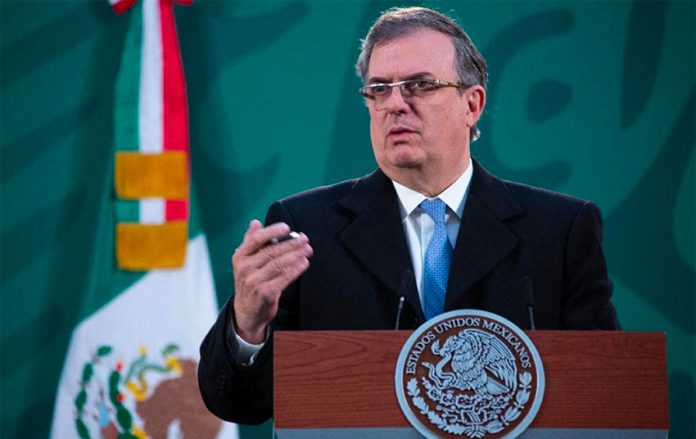Mexico will raise an objection at the United Nations over global inequality in access to Covid-19 vaccines, Foreign Minister Marcelo Ebrard said Tuesday.
“Tomorrow in the United Nations Security Council, we’re going to present the position of Mexico and Latin America with respect to what’s happening in the world – the inequality, the inequity there is in access to vaccines,” Ebrard told reporters at President López Obrador’s morning news conference.
Mexico is currently one of 10 non-permanent members of the 15-member Security Council.
Ebrard, who has played a leading role in the federal government’s efforts to secure vaccines for Mexico, said the countries that produce the Covid-19 shots have high vaccination rates whereas they are much lower in Latin American and Caribbean countries.
“Tomorrow we’re going to raise that in the Security Council because it’s not fair. That’s what the president has instructed me to do,” he said.
Mexico has urged the UN for months to work to guarantee equality among the nations of the world with regard to access to medications, medical equipment and vaccines to combat the coronavirus pandemic, which has claimed the lives of more than 2.4 million people around the world.
López Obrador on Monday urged the UN to hold a meeting to discuss the stockpiling and monopolization of vaccines, noting that the government had to enter into talks with European Union authorities to ensure that they would allow Pfizer vaccines manufactured in Belgium to be shipped to Mexico.
On Tuesday, he highlighted that the United States is not exporting vaccines to other countries.
“The United States plants are are only producing for the United States, that’s one of the things we want to look at with the UN so that there is equity, so that there is no vaccine stockpiling, so that there is a principle of equality so that all countries have the possibility to vaccinate their inhabitants,” López Obrador said.
Mexico has only received about 2 million doses as of Tuesday but less than half that number have been used.
However, the government has seven agreements to acquire 232 million mainly two-shot vaccines doses, Ebrard said, explaining that the number will be sufficient to inoculate 133 million million people, or about 105% of Mexico’s population.
The foreign minister said that Mexico will receive 55.5 million doses through the intergovernmental Covax initiative and has commercial agreements to purchase 77.4 million AstraZeneca vaccine doses to be manufactured in Argentina, just over 2 million doses of the same vaccine from the Serum Institute of India, 34.4 million Pfizer doses, 35 million single-dose CanSino Biologics vaccines, 24 million Sputnik V shots and 10 million Sinovac doses.
Mexico has so far only received about 1.25 million Pfizer doses, about 490,000 of which arrived Tuesday, and 870,000 AstraZeneca shots, which were flown into the country from India on Sunday. Full immunization with both vaccines requires two shots.
Most of the Pfizer doses received before today have been used to inoculate frontline health workers while the vaccination of seniors began Monday with the AstraZeneca shots.
Deputy Health Minister Hugo López-Gatell said Tuesday that 87,472 AstraZeneca doses – 10% of the total – were administered Monday in 30 of Mexico’s 32 states.
No vaccines were given in Tamaulipas and Nuevo León due to cold weather, he said.
“They couldn’t vaccinate for climatic reasons; if the AstraZeneca vaccine was exposed to the elements it would have been damaged. Prudently it was decided not to vaccinate yesterday but the vaccine is guaranteed for those states,” he said.
The inoculation of seniors was supposed to start in 1,081 vaccination centers in 333 marginalized, rural municipalities across Mexico on Monday but only 539 centers in 144 municipalities actually administered shots, the deputy minister said.
More than 30,000 of the 87,472 AstraZeneca doses administered Monday, or just over a third of the total, were given to seniors in the Mexico City boroughs of Milpa Alta, Cuajimalpa and Magdalena Contreras. Seniors waited in line for up to six hours in the capital to get a jab, and some complained that their photos were taken in order to be later posted to government websites.
As Mexico’s vaccination program begins to gather speed, the number of new coronavirus cases being reported on a daily basis is trending downwards.
An average of 8,775 new cases were reported each day between February 1 and 15, a 38% decline compared to the January average. The accumulated case tally currently stands at 1.99 million after 3,098 new cases were reported Monday.
A daily average of 1,075 Covid-19 deaths were reported during the first 15 days of the month, a 2% increase compared to January. The official death toll rose to 174,657 on Monday with 450 additional fatalities registered.
Source: Expansión Política (sp), Reforma (sp)
